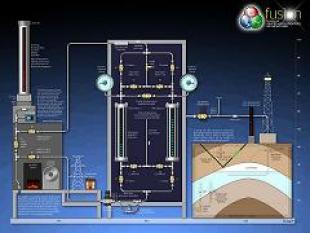Most of the world's energy currently derives from the combustion of fossil fuels; the UK is no exception. A key environmental problem is that fossil fuel combustion releases CO2 into the atmosphere. This is now, beyond reasonable doubt, linked to global warming and climate change. Atmospheric CO2 also dissolves in ocean water, forcing an increased acidity greater than any time in the past 20 million years.
Carbon Capture and Storage (CCS) is predicted by many authoritative studies to form 25% to 50% of the future remedy (including the International Energy Agency, Intergovernmental Panel on Climate Change, Stern Review, and Batelle Labs Energy Review).
CCS technologies are likely to become a major element in the energy strategies of countries such as the UK, US and Australia who wish to reduce their reliance on imported energy and who wish to reduce atmospheric CO2, which is linked to global warming, climate change and ocean acidification.
In Edinburgh we have created the UK's largest research group on Carbon Capture and Storage (CCS). Research in the group spans from underground geology and geophysics, to chemical engineering, capturing CO2 at large power plants, and also soil sciences and agricultural practice to capture CO2 from the atmosphere and return that to soil as long-lived charcoal. These are tremendously exciting areas of research, which are vital to today's society because they will play a key role in the reduction of excess CO2 in the atmosphere.
Climate change and energy policy are topics, which schools are keen to address, but there is currently little support provided to schools to help young people, educators and parents understand the concepts and implications of CCS technologies. The interactive demonstrator built in this project addresses the gap by communicating the concepts of Carbon Capture and Storage (CCS) technologies to schools. The CCS research team will work with the SCI-FUN Roadshow team to produce an attractive and engaging interactive which conveys the following three main concepts:
- The problem - the effects of too much CO2 in the environment causing climate change and ocean acidification.
- Technologies for capturing CO2 at power plant and the essential associated separation processes.
- Control methods to remove CO2 e.g. making biofuel and geological burial.
The research team will then use the interactive in the public engagement activities of the Scottish Centre for Carbon Storage. SCI-FUN has been operating in its current form for seven years and in that time it has developed excellent relationships with Scottish Secondary School teachers. SCI-FUN has a level of 85 per cent repeat visits to schools where it has been before. Follow up evaluation with the schools and local authorities gives consistently positive feedback.



